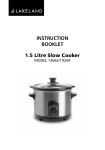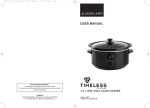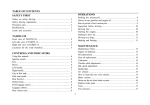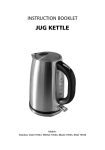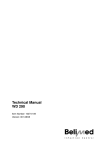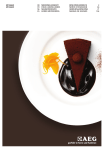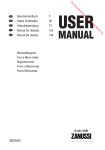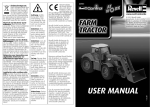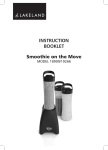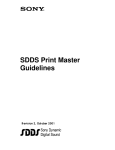Download INSTRUCTION BOOKLET 3.5 Litre Slow Cooker
Transcript
INSTRUCTION BOOKLET 3.5 Litre Slow Cooker MODEL 12921/19263 2 LAKELAND 3.5 LITRE SLOW COOKER Thank you for choosing the Lakeland Slow Cooker. Please take a little time to read this booklet before you use your machine and then keep it in a safe place for future reference. The slow cooker has a 3.5L bowl capacity making it ideal for cooking for families or making larger batches of recipes and freezing some portions for later. The slow cooking method gives great results on cheaper cuts of meat that often need to cook for longer to be at their best, making this a very economical cooking method. An award winning family-owned business, here at Lakeland we still have the same values of excellent quality, value for money and exceptional customer care as we did when we first set up the company in the 1960s. Our products are carefully selected and rigorously tested to meet our high standards, so you can be assured that any product you purchase will be easy-to-use and highly durable. CONTENTS Product Features 4 Safety Cautions 4 How to assemble the Slow Cooker and using for the first time 6 The Control Panel and Programmes 7 Instructions for use 7 A guide to ingredients 8 Adapting your own recipes 8 Recipes 10 Troubleshooting 14 Care and cleaning 14 Recycling your electricals 14 Electrical connections 15 3 PRODUCT FEATURES 1. Tempered glass lid with handle 2. Ceramic pot 3.Handles 4. Power indicator light 5. Control dial SAFETY CAUTIONS Carefully read all the instructions before using the appliance and keep in a safe place for future reference. Always follow these safety cautions when using the appliance to avoid personal injury or damage to the appliance. This appliance should be used only as described in this instruction book. 4 • Make sure your electricity supply matches the voltage shown on the appliance. • nsure all packaging materials and any promotional labels or stickers are removed from the E appliance before the first use. • lways inspect the appliance before use for noticeable signs of damage. Do not use if A damaged or has been dropped. In the event of damage, or if the appliance develops a fault, contact the Lakeland customer care team on 015394 88100. • Do not use this appliance if the lead is damaged. If the lead is damaged it must be replaced with a special lead, please contact Lakeland customer care team on 015394 88100. • Always use the appliance on a dry, level, heat resistant surface. • nplug from the mains when not in use and before cleaning. Allow to cool before cleaning U the appliance. To disconnect, turn the socket to ‘off ‘and remove the plug from the mains socket. • his appliance is not intended for use by persons (including children) with reduced physical, T sensory or mental capabilities, or lack of experience and knowledge, unless they have been given supervision or instruction concerning the use of the appliance by a person responsible for their safety. • Children should always be supervised to ensure they do not play with this product. • o not use any accessories or attachments with this appliance other than those recommended D by Lakeland. • o protect against fire, electric shock or personal injury, do not immerse cord, plug or outer T unit in water or other liquids. • o not leave the lead hanging over the edge of a kitchen table or worktop. Avoid contact D between the lead and hot surfaces. • For indoor use only. • For domestic use only. • his appliance should be used for preparation of food as described within the instructions for T use that accompany it. • lways ensure that your hands are dry before removing the plug from the mains socket. Never A pull the plug out of the mains socket by its lead. • To avoid injury or possible fire, do not cover the appliance when in use. • Do not connect this appliance to an external timer or remote control system. • n extension cable may be used with care. The electrical rating of the cable should be at least A as great as the appliance. Do not allow the cable to hang over the edge of the worktop or touch any hot surfaces. • his appliance complies with the basic requirements of Directives 04/108/EC (Electromagnetic T Compatibility) and 06/95/EC (Safety of Domestic Electrical Appliances). • ARNING; A cut off plug inserted into a 13amp socket is a serious safety (shock) hazard. W Ensure the cut off plug is disposed of safely. • The slow cooker surfaces will be very hot when the appliance is in use. DO NOT touch these as possible injury could occur. Allow to cool completely before handling this appliance and always use the handles to move appliance or lift lid. Always wear oven gloves. Take great care when lifting out the crock with hot food inside. • CAUTION; The plastic bags used to wrap this appliance or the packaging may be dangerous. To avoid risk of suffocation, keep these bags out of reach of babies and children. These bags are not toys. • he ceramic pot in the slow cooker gets hot during cooking, use oven gloves to lift it out of T the slow cooker. • The slow cooker should be unplugged from the mains supply before filling or emptying the ceramic pot. 5 • Do not heat the slow cooker when the ceramic pot is empty. • o not place the slow cooker or the ceramic pot directly on a gas or electric hob or other D heat source. • hen removing the lid, tilt it so that the opening faces away from you to avoid being burned W by steam. • Do not place the slow cooker on or near a hot gas or electric burner, or in or near a heated oven. • To avoid electric shock or damage, never put food directly into the slow cooker base. Always use the ceramic crock. • To switch off the slow cooker, turn the dial to OFF and unplug from the socket. Always unplug before lifting out the crock, when not in use and before cleaning. Let the slow cooker cool down before cleaning. • Please handle the crock and lid with care, and avoid extremes of temperature. Once the crock is warm, do not add further chilled ingredients. Allow the crock and lid to cool before washing. • Using accessories that are not recommended by the manufacturer may cause fire, electric shock or injury. HOW TO ASSEMBLE THE SLOW COOKER AND USING FOR THE FIRST TIME 6 • he first time the appliance is used there may be a slight smoke smell, this is normal and is T not a concern. It should disappear after initial use. • efore first use, wash the lid and ceramic pot in hot, soapy water, rinse and dry thoroughly. B Do not ever immerse the base in water. • repare the recipe according to the instructions. Place the food in the ceramic pot and then P place the lid on top of the pot. • Connect the plug of the slow cooker to power socket and switch on socket. • Select temperature setting. • hen you have finished cooking in the slow cooker, turn the control dial to the off setting, W switch off the mains supply at the socket and unplug. • Let ceramic pot and the lid cool before washing. THE CONTROL PANEL AND PROGRAMMES • hen not being used to cook, the control dial on the slow cooker should be turned to off and W the mains plug should also be switched off and removed from the socket. • he final temperature of the food is about 120ºC whether it has been cooked on the low or T high setting. The only difference between these settings is the amount of time the cooking process takes. • he slow cooker has three temperature settings so cooking times can be easily adapted. T Meals can be slowly simmered all day long, or can be ready in just a few hours. Over time you will develop a feel for how long your favourite recipes take, and this cooking guide offers a helpful starting point. • UTO: the standard setting, with an average cooking time of 6-8 hours. Food is cooked on A HIGH until the correct temperature is reached then kept warm until you are ready to serve. • LOW: if you wish to extend the cooking time. • HIGH: if you wish to shorten the cooking time. Cook on auto Cook on low Cook on high 4-6 hours 6-8 hours 3-4 hours 6-8 hours 8-10 hours 5-6 hours 8-10 hours 10-12 hours 7-8 hours Please note: all cooking times are approximate, and will vary according to your recipe and choice of ingredients. INSTRUCTIONS FOR USE • he beauty of slow cooking is that you can add the ingredients, turn on the slow cooker and T enjoy a tender, moist and flavourful meal hours later, with little work required. • This 3.5 litre slow cooker has a maximum working capacity of 2.5 litres, allowing for bubbling and simmering. • L ifting the lid of the slow cooker results in temperature loss and adds about 25 minutes to the cooking time. Avoid having to lift lid if at all possible. • Ideally the slow cooker should be at least 1/3 full when cooking food for it to perform at its best. 7 A GUIDE TO INGREDIENTS • o ensure uniform cooking, prepare meat and vegetables so they are in similar sized pieces T and will cook evenly. Root vegetables often take longer to cook than meat, so they should be more finely diced or chopped. • ou may need to reduce liquids in recipes to around half, because the slow cooker is covered Y by a lid. If you find there is too much liquid at the end of cooking time, you can remove the lid and cook on high for about 30 minutes until the liquid reduces. • he slow cooking method gives great results when cooking cheaper cuts of meat which T require longer cooking in order to become tender, but often have more flavour. • rown the meat before adding it to the slow cooker. This adds flavour to the final dish and B the meat often looks more attractive. • If you wish to use frozen meats, defrost thoroughly before adding to the slow cooker, never cook from frozen. • If you don’t have time to get your ingredients ready in the morning, they can be prepared the night before and stored in the fridge. In the morning, transfer the food to the crock. Add enough boiling liquid e.g. stock, to cover the ingredients, before switching on the slow cooker. • As a general guide, most meat-and-vegetable recipes require 5-7 hours on auto warm, 4-5 hours on high and 7-9 hours on low. • Slow cooking requires very little in the way of stirring, but you may like to give your food an occasional stir if cooking on HIGH. ADAPTING YOUR OWN RECIPES After you have made some of the recipes supplied you may wish to adapt a few of your own recipes. 8 • tart by selecting one of the recipes in this booklet, which is similar to your own and use this S as a guide. • dapt your recipes by chopping everything in uniform sized pieces so it will all cook evenly A and be ready at once. • Place items which may need longer to cook near the base of the pan. This means they are nearer the heat source and are likely to sit in any liquid which will also help them to cook. • F ish and seafood tend to dry out quickly so are best added to dishes near the end of cooking time. • ecipes will require far less liquid than their equivalents cooked on the hob: reduce the liquid R by half, you can always top up during cooking if it seems too dry. • educe salt in recipes as the long slow cook and reduced liquid means flavours are more R enhanced and less salt is required. • ecipes often say, ‘Bring to boil, and then turndown‘. In slow cookers this is not necessary. R Simply set the cooker on low. • F resh herbs are best added near the end of cooking; dried herbs can be added along with the main ingredients. Approximate cooking times for recipe conversions • If recipe suggests to cook for 15-30 minutes, it will need up to 2 hours on the high setting in the slow cooker. • If recipe suggests to cook for 30-45 minutes, it will need up to 4 hours on the high setting in the slow cooker. • If recipe suggests to cook for 2-3 hours, it will need up to 6 hours on the high setting in the slow cooker (see the cooking times chart on page 6). 9 RECIPES Chilli Con Carne Serves 2 to 4 people Ingredient Quantity Oil 30ml / 2 tbsp Large onion, peeled and chopped 1 Clove garlic, peeled and crushed 1 Green pepper, deseeded and chopped 1 Button mushrooms, sliced 100g / 4oz Lean minced beef 450g / 1lb Can chopped tomatoes 400g / 14oz Salt and freshly ground black pepper Tomato puree 30ml / 2 tbsp Beef stock 450ml / ¾ pint Chilli powder 3 tsp Can red kidney beans, drained and rinsed 420g / 15oz AUTO WARM: 5 to 7 hours 1. 2. 3. 4. 5. 10 Heat the oil in a saucepan, add the onion, garlic and green pepper and cook for 2 to 3 minutes. Add the mushrooms and minced beef and cook for 3 to 4 minutes until browned. Stir in the tomatoes, tomato puree, stock, chilli powder, salt and pepper. Bring to the boil, then transfer to the crock insert and cook as recommended. Stir in the beans 30 to 45 minutes before the end of cooking. Hawaiian Pork Casserole Serves 2 to 4 people Ingredient Quantity Oil 15ml / 1 tbsp Onion, peeled and chopped 1 Clove garlic, peeled and crushed 1 Green pepper, deseeded and sliced 1 Button mushrooms, sliced 100g / 4oz Pork fillet, cubed 750g / 1½lb Plain flour 25g / 1oz Pork or chicken stock 600ml / 1 pint Dry sherry 30ml / 2 tbsp Can pineapple chunks 432g / 15¼oz Salt and freshly ground pepper AUTO WARM (if you pre-cook the ingredients, as below): 6 to 9 hours AUTO WARM (without pre-cooking): 8 to 10 hours 1. 2. 3. 4. 5. Heat the oil in a saucepan, add the onion and garlic and cook for 2 to 3 minutes. Add the green pepper and mushrooms and cook for 1 to 2 minutes. Toss the pork in the flour, add to the pan and cook until browned. Add the remaining ingredients and bring to the boil. Transfer to the crock insert and cook as recommended. 11 Coq Au Vin Serves 2 to 4 people Ingredient Quantity Oil 15ml / 1 tbsp Butter 15g / ½oz Bacon, chopped 100g / 4oz Shallots, peeled 175g / 6oz Clove garlic, peeled and crushed 1 Button mushrooms, sliced 225g / 8oz Chicken breasts, boneless and skinned 4 Plain flour 25g / 1oz Red wine 300ml / ½ pint Chicken stock 450ml / ¾ pint Bay leaf 1 Bouquet garni 1 Dried thyme ½ tsp Salt and freshly ground pepper AUTO WARM (if you pre-cook the ingredients, as below): 4 to 6 hours AUTO WARM (without pre-cooking): 6 to 9 hours 1. 2. 3. 4. 5. 6. 7. 12 Place the oil and butter in a saucepan and heat until melted. Add the bacon, shallots, garlic and mushrooms and cook for 3 to 4 minutes. Remove and place in a bowl. Coat the chicken in the flour, add to the pan and cook for 3 to 4 minutes. Return the bacon and vegetables to the pan. Stir in the remaining ingredients and bring to the boil. Transfer to the crock insert and cook as recommended. Poached Pears with Caramel Sauce Serves 2 to 4 people Ingredient Quantity Medium sized ripe pears 4 Caster sugar 75g / 3oz Cold water 1.5 litre / 3 pints Lemon juice 15ml / 1 tbsp For the sauce: Butter 50g / 2oz Soft light brown sugar 75g / 3oz Granulated sugar 50g / 2oz Golden syrup 150g / 5oz Single cream 124ml / 5fl oz Vanilla extract Few drops LOW: 3½ to 5½ hours AUTO WARM: 3 to 5 hours 1. Peel the pears, leaving the stalk intact. 2. Cut a small slice off the base of each pear so it sits upright. 3. Switch on the slow cooker. 4.Place the caster sugar, water and lemon juice in the crock insert and stir until the sugar dissolves. 5. Add the pears, cover with the lid and cook as recommended. 6. Drain and remove the pears. For the sauce: 1. Place the butter, sugar and syrup in a saucepan and heat gently until the sugar dissolves. 2. Boil for 4 to 5 minutes. 3. Stir in the cream and vanilla extract and serve with the pears. 13 TROUBLESHOOTING Here are some common problems that can occur when using the slow cooker. Please review the problems, their possible cause and any corrective action that should be taken to ensure successful slow cooking Problem Possible cause Solution Finished recipe seems wet. Too much liquid in recipe. Remove lid from slow cooker and cook on the high setting for 30 minutes (next time reduce liquid by half). Vegetables seem crunchy but meat is well cooked. The vegetable pieces are too large. Next time cut the vegetables into smaller pieces. Place them on the bottom of the slow cooker and the meat on top. Meat seems colourless. Meat has been cooked from raw with the other ingredients in the slow cooker. Brown meat before adding to the slow cooker to enhance appearance and flavour of final dish. A favourite hob top recipe seems very salty when cooked in slow cooker. Reduced liquid and the long slow cooking time can make dish flavours develop more and seem saltier. Reduce the amount of salt used in the recipe. Herb flavours do not come through in recipe. Fresh herbs can get overcooked in the slow cooker because of the long cooking time. Use dried herbs at the beginning of the cooking process. Add fresh herbs near end of cooking to retain their flavours. CARE AND CLEANING • Unplug the slow cooker-and allow to cool completely before cleaning. • Before the first use and after every use, clean each part thoroughly. • Periodically check all parts before reassembly. • Never immerse the base unit in water or any other liquid. • To clean the base unit and control panel, when cold, wipe with a clean damp cloth and dry before storing. • Do not use abrasive cleaners, steel wool or abrasive materials or cleansers. • When cold, wash the ceramic pot and the lid in hot, soapy water, rinse and dry thoroughly. • Store the slow cooker with the power cable loosely coiled. Never wrap it tightly around the unit. RECYCLING YOUR ELECTRICALS Along with many other high street retailers, Lakeland has joined a scheme whereby customers can take their unwanted electricals to recycling points set up around the country. Visit www.recycle-more.co.uk to find your nearest recycling point. 14 ELECTRICAL CONNECTIONS THIS APPLIANCE MUST BE EARTHED This appliance is fitted with a fused three-pin plug to BS1363 which is suitable for use in all homes fitted with sockets to current specifications. If the fitted plug is not suitable for your socket outlets, it should be cut off and carefully disposed of. To avoid an electric shock, do not insert the discarded plug into a socket. FITTING A NEW PLUG If for any reason you need to fit a new plug, the flexible mains lead must be connected as shown here. The wires in the mains lead fitted to this appliance are coloured in accordance with the following code: Earth(green/yellow) Neutral(blue) 3amp FUSE E L 3amp fuse N Live(brown) Connect BLUE to Neutral (N) Connect GREEN & YELLOW to Earth (E) Connect BROWN to Live (L) 3 amp fuse to be used If the colours of the wires in the mains lead of this appliance do not correspond with the coloured markings identifying the terminals in your plug, proceed as follows. The wire which is coloured green and yellow MUST be connected to the terminal which is marked with the letter E (Earth) or coloured green. The wire which is coloured blue MUST be connected to the terminal which is marked with the letter N (Neutral) or coloured black. The wire which is coloured brown MUST be connected to the terminal which is marked with the letter L (Live) or coloured red. Before refitting the plug cover, check that there are no cut or stray strands of wire inside the plug. Use a 3 amp BS1362 fuse. Only BSI or ASTA approved fuses should be used. If you are at all unsure which plug or fuse to use, always refer to a qualified electrician. Note: after replacing or changing a fuse on a moulded plug which has a fuse cover, the cover must be refitted to the plug; the appliance must not be used without a fuse cover. If lost, replacement fuse covers can be obtained from an electrical shop. This appliance complies with the following EC Directives: 2006/95/EC (Low Voltage Directive) and 2004/108/EC (EMC Directive). 15 GEBRAUCHSANWEISUNG 3,5 Liter-Schmortopf MODELL 12921/19263 16 3,5 Liter-SCHMORTOPF VON LAKELAND Vielen Dank, dass Sie sich für den Kauf des Schmortopf von Lakeland entschieden haben. Bitte lesen Sie sich diese Anleitung vor der Inbetriebnahme Ihres neuen Geräts aufmerksam durch und bewahren Sie sie gut auf, falls Sie später auf die hier enthaltenen Informationen zurückgreifen möchten. Der Schmortopf hat ein Fassungsvermögen von 3,5 l und somit die ideale Größe für Familien oder für die Zubereitung größerer Mengen und einzelner Portionen zum Einfrieren. Beim Schmoren werden preiswertere Fleischstücke, die gewöhnlich länger garen müssen, besonders schmackhaft, was dieses Verfahren besonders wirtschaftlich macht. Unser mehrfach ausgezeichneter Familienbetrieb legt heute genauso viel Wert auf ein Höchstmaß an Qualität, ein gutes Preis-Leistungsverhältnis und einen hervorragenden Kundenservice wie damals in den 60er Jahren, als Lakeland gegründet wurde. Unsere Artikel werden mit größter Sorgfalt ausgewählt und im Einklang mit unseren strengen Standards gründlich geprüft. So haben Sie die Gewähr, dass jeder Artikel, den Sie bei uns kaufen, bedienungsfreundlich und langlebig ist. INHALT Produktbeschreibung 18 Sicherheitshinweise 18 Montageanleitung für den Schmortopf vor der ersten Ingebrauchnahme 20 Das Bedienfeld und die Schmorprogramme 21 Bedienungsanleitung 22 Zutaten im Überblick 22 Verwendung eigener Rezepte 23 Fehlerbehebung 24 Pflege und Reinigung 25 17 AUSSTATTUNGSMERKMALE 1. Hartglasdeckel mit Griff 2.Keramiktopf 3.Griffe 4.Kontrollleuchte 5.Thermostatregler SICHERHEITSHINWEISE Lesen Sie sich die Gebrauchsanweisung vor Inbetriebnahme des Geräts sorgfältig durch und bewahren Sie diese für den weiteren Gebrauch sicher auf. Befolgen Sie beim Gebrauch des Geräts stets diese Sicherheitshinweise, um Körperverletzungen oder Schäden am Gerät zu vermeiden. Dieses Gerät ist nur für den vorgesehenen Zweck gemäß der Beschreibung in dieser Gebrauchsanweisung vorgesehen. 18 • Stellen Sie sicher, dass Ihre Stromversorgung mit der auf dem Gerät angegebenen Spannung übereinstimmt. • ntfernen Sie vor der ersten Inbetriebnahme alle Verpackungsmaterialien sowie Werbeetiketten E vom Gerät. • ergewissern Sie sich stets vor Gebrauch des Produkts, dass es keine erkennbaren Schäden V aufweist. Verwenden Sie es nicht, falls es Schäden aufweist oder versehentlich fallen gelassen wurde. Wenden Sie sich im Falle von Schäden oder Defekten am Gerät an den Kundenservice von Lakeland unter der Rufnummer 0800 444 1500. • Verwenden Sie das Produkt nicht, falls das Netzkabel beschädigt ist. Falls das Netzkabel beschädigt ist, muss es durch ein Spezialkabel ersetzt werden. Wenden Sie sich in diesem Fall bitte unter der Rufnummer 0800 444 1500 an den Kundenservice von Lakeland. • Stellen Sie das Gerät zum Gebrauch stets auf einer trockenen, ebenen und hitzebeständigen Fläche auf. • iehen Sie den Netzstecker bei Nichtgebrauch und vor der Reinigung des Geräts aus der Z Netzsteckdose. Lassen Sie das Gerät vor der Reinigung vollständig abkühlen. Um das Gerät abzuschalten, ziehen Sie den Netzstecker aus der Netzsteckdose. • ieses Gerät ist nicht für Personen (Kinder eingeschlossen) mit eingeschränkten körperlichen, D sensorischen oder geistigen Fähigkeiten bzw. mit mangelnder Erfahrung und fehlenden Kenntnissen vorgesehen, es sei denn, diese werden angemessen beaufsichtigt oder haben entsprechende Anleitungen zur Verwendung des Geräts von einer Person erhalten, die für ihre Sicherheit verantwortlich ist. • Kinder müssen stets beaufsichtigt werden, damit sie nicht mit dem Gerät spielen können. • Verwenden Sie nur die von Lakeland empfohlenen Zubehörteile und Einsätze. • auchen Sie Netzkabel, Netzstecker oder Gehäuse nicht in Wasser oder andere Flüssigkeiten T ein. Es besteht Brand-, Stromschlag- und Verletzungsgefahr! • L assen Sie das Netzkabel nicht vom Küchentisch oder von der Arbeitsplatte herunterhängen. Sorgen Sie dafür, dass das Netzkabel nicht mit heißen Oberflächen in Berührung kommt. • Nur für Innenräume. • Nur für den häuslichen Gebrauch. • ieses Gerät ist nur für die Zubereitung von Speisen gemäß der Beschreibung in der D mitgelieferten Gebrauchsanweisung vorgesehen. • rocknen Sie Ihre Hände stets vor Herausziehen des Netzsteckers aus der Netzsteckdose ab. T Ziehen Sie den Netzstecker nie am Netzkabel aus der Netzsteckdose heraus. • Decken Sie das Gerät während des Gebrauchs nicht ab. Es besteht Verletzungs- und möglicherweise Brandgefahr! • Schließen Sie das Gerät nicht an eine externe Zeitschaltuhr oder an ein System mit Fernbedienung an. • ir raten zur vorsichtigen Benutzung von Verlängerungskabeln. Die elektrischen W Anschlussdaten des Kabels müssen mindestens so hoch wie die des Geräts sein. Achten Sie darauf, dass das Netzkabel nicht von der Arbeitsplatte herunterhängt bzw. mit heißen Flächen in Berührung kommt. • ieses Gerät entspricht den Grundanforderungen der EMV-Richtlinie 2004/108/EG D (Elektromagnetische Verträglichkeit) und der Niederspannungsrichtlinie 2006/95/EG (Sicherheit elektrischer Betriebsmittel). • ARNHINWEIS: Bei der Verwendung eines abgeschnittenen Steckers in einer W 13A-Netzsteckdose besteht schwere Verletzungsgefahr durch elektrischen Schlag! Sorgen Sie dafür, dass der abgeschnittene Stecker ordnungsgemäß entsorgt wird. 19 • Die Oberflächen des Schmortopfes können bei Verwendung des Geräts sehr heiß werden. Berühren Sie diese Flächen NICHT, da Verletzungsgefahr besteht. Lassen Sie das Gerät vor dem erneuten Gebrauch vollständig abkühlen, bevor Sie es an den Griffen bewegen oder den Deckel anheben. Tragen Sie stets Ofenhandschuhe. Seien Sie besonders vorsichtig, wenn Sie den Keramiktopf mit einem heißen Gericht darin hochheben. • VORSICHT: Die Kunststoff-Verpackungsmaterialien stellen eine Gefahr dar. Sie dürfen nicht in die Hände von Babys und Kindern gelangen, da Erstickungsgefahr besteht. Diese Verpackungsmaterialien sind kein Spielzeug. • a der Keramiktopf im Schmortopf beim Kochen heiß wird, sollte er nur mit Ofenhandschuhen D aus dem Schmortopf gehoben werden. • Ziehen Sie den Netzstecker des Schmortopfes aus der Netzsteckdose, bevor Sie den Keramiktopf füllen oder leeren. • Heizen Sie den Schmortopf nicht auf, wenn der Keramiktopf leer ist. • tellen Sie den Schmortopf oder den Keramiktopf nicht direkt auf einen Gas- oder Elektroherd S bzw. auf eine andere Wärmequelle. • chten Sie beim Abnehmen des Deckels darauf, dass Sie ihn von Ihnen weg gewandt öffnen, A um keine Verbrennungen zu erleiden. • Stellen Sie den Schmortopf nicht auf eine heiße Herdplatte oder in der Nähe davon bzw. in einen heißen Backofen oder in der Nähe davon. • Zum Schutz vor Stromschlag oder sonstigen Schäden dürfen Zutaten niemals direkt in den Schmortopf gegeben werden. Verwenden Sie stets den Keramiktopf. • Den Schmortopf schalten Sie aus, indem Sie den Regler in die Aus-Position (OFF) bringen und den Netzstecker aus der Netzsteckdose ziehen. Ziehen Sie den Stecker stets aus der Steckdose heraus, bevor Sie den Keramiktopf herausheben bzw. wenn er nicht benutzt bzw. bevor er gereinigt wird. Lassen Sie den Schmortopf vor der Reinigung vollständig abkühlen. • Gehen Sie vorsichtig mit dem Keramiktopf und Deckel um und vermeiden Sie extreme Temperaturschwankungen. Sobald der Keramiktopf warm ist, sollten keine weiteren kalten Zutaten hinzugefügt werden. Lassen Sie den Keramiktopf und Deckel vor dem Spülen abkühlen. • Der Einsatz von Zubehör, das nicht vom Hersteller des Geräts empfohlen wurde, kann zu einem Brand, Stromschlag und/oder zu Verletzungen führen. MONTAGEANLEITUNG FÜR DEN SCHMORTOPF VOR DER ERSTEN INGEBRAUCHNAHME 20 • enn das Gerät zum ersten Mal in Gebrauch genommen wird, kann ein leichter Rauchgeruch W entstehen, was völlig normal und kein Grund zur Beunruhigung ist. Er lässt nach dem ersten Gebrauch nach. • einigen Sie den Deckel und Keramiktopf vor der ersten Ingebrauchnahme in heißem Wasser R mit Spülmittel, spülen ihn gut ab und trocknen ihn sorgfältig. Den Geräteboden niemals in Wasser tauchen. • ichten Sie sich bei der Zubereitung nach dem Rezept. Geben Sie alle Zutaten in den R Keramiktopf und legen Sie den Deckel auf. • Stecken Sie den Netzstecker des Schmortopfes in die Netzsteckdose. • Wählen Sie die Temperatureinstellung. • tellen Sie den Thermostatregler nach abgeschlossenem Garvorgang in die Aus-Position (OFF) S und ziehen den Netzstecker des Schmortopfes heraus. • Lassen Sie den Keramiktopf und Deckel vor dem Spülen abkühlen. DAS BEDIENFELD UND DIE SCHMORPROGRAMME • ird der Schmortopf nicht verwendet, sollte der Thermostatregler ausgestellt und der W Netzstecker aus der Netzsteckdose herausgezogen werden. • as Gargut hat nach Ablauf der Garzeit eine Temperatur von ca. 120ºC unabhängig von D der Gartemperatur (Low oder High). Der einzige Unterschied zwischen diesen beiden Garfunktionen ist die jeweils benötigte Garzeit. • er Schmortopf hat drei Temperatureinstellungen für unterschiedliche Garzeiten. Das Gargut D kann entweder den ganzen Tag lang sanft köcheln oder aber der Garvorgang kann in nur wenigen Stunden abgeschlossen sein. Im Laufe der Zeit entwickeln Sie ein Gefühl dafür, wie lange Ihre Lieblingsgerichte garen müssen, was Ihnen mit dieser Garzeitentabelle bestimmt gelingt. • UTO: die Standardeinstellung mit einer durchschnittlichen Garzeit von 6-8 Stunden. Das A Gargut wird auf höchster Stufe (HIGH) gegart, bis die korrekte Temperatur erreicht ist, und dann bis zum Servieren warm gehalten. • LOW: wenn Sie die Garzeit verlängern möchten. • HIGH: wenn Sie die Garzeit verkürzen möchten. Garautomatik Langsam garen Schnell garen 4-6 Stunden 6-8 Stunden 3-4 Stunden 6-8 Stunden 8-10 Stunden 5-6 Stunden 8-10 Stunden 10-12 Stunden 7-8 Stunden Hinweis: alle Garzeiten sind ungefähre Angaben, die je nach Rezept und Wahl der Zutaten abweichen können. 21 GEBRAUCHSANWEISUNG • as Schöne am Schmoren ist, dass Sie alle Zutaten gleichzeitig und mit minimalem D Arbeitsaufwand in den Schmortopf geben, diesen anstellen und sich nach ein paar Stunden auf ein herrlich saftiges, vollmundiges Gericht freuen können. • Dieser 3,5-Liter-Schmortopf hat ein Fassungsvermögen von maximal 2,5 Liter, damit das Gargut Platz zum Sieden und Aufwallen hat. • it jedem Anheben des Schmortopfdeckels sind ein Temperaturverlust und eine um M 25 Minuten längere Garzeit verbunden. Heben Sie den Deckel nach Möglichkeit nicht an. • er Schmortopf sollte idealerweise mindestens zu einem Drittel mit Zutaten gefüllt sein, um D so die besten Ergebnisse zu erzielen. ZUTATEN IM ÜBERBLICK • m einen gleichmäßigen Garprozess zu gewährleisten, sollten Fleisch und Gemüse in gleich U große Stücke geschnitten werden, damit sie gleichförmig garen. Da Wurzelgemüse oftmals länger garen muss als Fleisch, sollte es in kleinere Würfel oder Stücke geschnitten werden. • öglicherweise müssen Sie die in den Rezepten angegebene Flüssigkeitsmenge auf die Hälfte M reduzieren, da im Schmortopf mit Deckel gegart wird. Ist Ihr Gericht nach abgelaufener Garzeit dennoch zu flüssig, nehmen Sie den Deckel ab und garen alles auf höchster Stufe ca. 30 Minuten, bis die Flüssigkeit eingedickt ist. • eim Schmoren entfalten insbesondere preiswertere Fleischstücke, die gewöhnlich erst nach B längerem Garen zart werden, ihren vollen Geschmack. • räunen Sie das Fleisch erst an, bevor Sie es in den Schmortopf geben. So schmeckt Ihr B Gericht nicht nur besser, sondern auch das Fleisch sieht appetitlicher aus. • enn Sie TK-Fleisch hinzugeben möchten, tauen Sie dies grundsätzlich vollständig auf, bevor W Sie es in den Schmortopf geben. • Wenn Sie Ihre Zutaten aus zeitlichen Gründen nicht morgens vorbereiten können, können Sie dies stattdessen am Vorabend tun und diese im Kühlschrank aufbewahren. Geben Sie sie am nächsten Morgen einfach in den Keramiktopf. Fügen Sie ausreichend kochend heiße Flüssigkeit wie Brühe hinzu, legen den Deckel auf den Topf und schalten den Schmortopf ein. • Für die meisten Fleisch- und Gemüse-Rezepte werden generell 5-7 Stunden auf warm (Garautomatik) bzw. 4-5 Stunden auf höchster Stufe bzw. 7-9 Stunden auf niedrigster Stufe benötigt. • Beim Schmoren müssen die Zutaten kaum umgerührt werden; wenn Sie Ihre Zutaten allerdings auf höchster Stufe garen, können Sie dies gelegentlich tun. 22 VERWENDUNG EIGENER REZEPTE Nachdem Sie ein paar der vorgeschlagenen Rezepte ausprobiert haben, möchten Sie sich ja vielleicht an Ihre eigenen Rezepte heranwagen. • ählen Sie eines der Rezepte aus diesem Heft, das Ihrem eigenen Rezept ähnelt, und richten W Sie sich grob danach. • assen Sie Ihre Rezepte an, indem Sie alle Zutaten in gleichförmige Stücke zuschneiden, die P gleichzeitig gar werden. • Geben Sie Zutaten, die ggf. länger garen müssen, auf den Boden des Karamiktopfes. Somit befinden sie sich nicht nur näher an der Wärmequelle, sondern schmoren auch eher in Flüssigkeit und werden somit schneller gar. • a Fisch und Meeresfrüchte schnell austrocknen, gibt man sie am besten gegen Ende der D Garzeit in den Topf. • enerell gilt, dass wesentlich weniger Flüssigkeit als beim herkömmlichen Kochen auf dem G Herd erforderlich ist: reduzieren Sie die Garflüssigkeit auf die Hälfte; sollte Ihr Gericht beim Garen zu trocken wirken, können Sie stets weitere Flüssigkeit hinzufügen. • erwenden Sie weniger Salz als im Rezept angegeben, da das Gericht durch das langsame V Schmoren und die geringere Flüssigkeitsmenge geschmacksintensiver ist und weniger Salz erfordert. • I n Rezepten heißt es häufig „Zum Kochen bringen und dann die Temperatur herunterschalten“. In einem Schmortopf ist dies nicht erforderlich. Stellen Sie Ihren Schmortopf einfach auf die niedrigste Stufe. • Frische Kräuter gibt man am besten kurz vor Garende hinzu; getrocknete Kräuter können zusammen mit den Hauptzutaten hinzugefügt werden. Berechnung und Umrechung der Garzeiten • ei einer in einem Rezept angegebenen Garzeit von 15-30 Minuten ist im Schmortopf eine B Garzeit von bis zu 2 Stunden auf höchster Stufe erforderlich. • ei einer in einem Rezept angegebenen Garzeit von 30-45 Minuten ist im Schmortopf eine B Garzeit von bis zu 4 Stunden auf höchster Stufe erforderlich. • ei einer in einem Rezept angegebenen Garzeit von 2-3 Stunden ist im Schmortopf eine B Garzeit von bis zu 6 Stunden auf höchster Stufe erforderlich (siehe Garzeitentabelle auf Seite 7). 23 FEHLERBEHEBUNG Hier haben wir gängige Probleme zusammengestellt, die beim Betrieb des Schmortopfes auftreten können. In der Tabelle sind die Probleme, deren mögliche Ursachen sowie für jede Ursache eine Maßnahme zur Behebung aufgeführt, um ein erfolgreiches Schmoren zu gewährleisten. Problem Mögliche Ursache(n) Abhilfe Zu viel Flüssigkeit im Rezept Nehmen Sie den Deckel vom Schmortopf und garen Sie alles auf höchster Stufe 30 Minuten lang (reduzieren Sie die Garflüssigkeit das nächste Mal auf die Hälfte) Das Gemüse ist noch knackig, das Fleisch hingegen gar Die einzelnen Gemüsestücke sind zu groß Schneiden Sie das Gemüse das nächste Mal in kleinere Stücke und geben Sie diese unten in den Schmortopf und das Fleisch obendrauf. Das Fleisch wirkt farblos Das rohe Fleisch wurde zusammen mit anderen Zutaten im Schmortopf gegart Bräunen Sie das Fleisch vorher an und geben es dann in den Schmortopf – dadurch gewinnt das fertige Gericht an Aussehen und Aroma Eines meiner Lieblingsrezepte schmeckt aus dem Schmortopf sehr salzig Durch weniger Flüssigkeit und lange Garzeiten kann ein Gericht intensiver und salziger schmecken Reduzieren Sie die im Rezept angegebene Menge Salz Frische Kräuter können im Schmortopf aufgrund der langen Garzeiten verkochen Verwenden Sie zu Beginn des Garprozesses getrocknete Kräuter. Geben Sie kurz vor Garende frische Kräuter hinzu, damit sie ihren Geschmack beibehalten. Das fertige Gericht ist zu flüssig Kräuter kommen in dem Rezept nicht zur Geltung 24 PFLEGE UND REINIGUNG • Ziehen Sie den Netzstecker des Schmortopfes aus der Steckdose und lassen Sie das Gerät vor der Reinigung vollständig abkühlen. • Reinigen Sie jedes einzelne Teil des Geräts vor der ersten Inbetriebnahme und nach jedem Gebrauch gründlich. • Überprüfen Sie alle Komponenten in regelmäßigen Abständen, bevor Sie sie zusammensetzen. • Tauchen Sie den Geräteboden niemals in Wasser oder andere Flüssigkeiten ein. • Wischen Sie den Geräteboden und das Bedienfeld mit einem sauberen, feuchten Tuch ab, wenn das Gerät abgekühlt ist, und lassen Sie es trocknen, bevor Sie es verstauen. • Benutzen Sie zur Reinigung des Geräts keine Scheuermittel, Stahlwolle oder Scheuerschwämme. • Reinigen Sie den abgekühlten Keramiktopf und Deckel in heißem Wasser mit Spülmittel, spülen ihn gut ab und trocknen ihn sorgfältig. • Verstauen Sie den Schmortopf so, dass das Netzkabel lose um das Gerät herumgewickelt ist. Wickeln Sie es nie fest um das Gerät. 25 26 27 Lakeland Alexandra Buildings, Windermere, Cumbria, LA23 1BQ, Großbritannien Tel.: +44(0)15394 88100 Web: www.lakeland.co.uk D Tel.: 0800 444 1500 www.lakeland.de




























